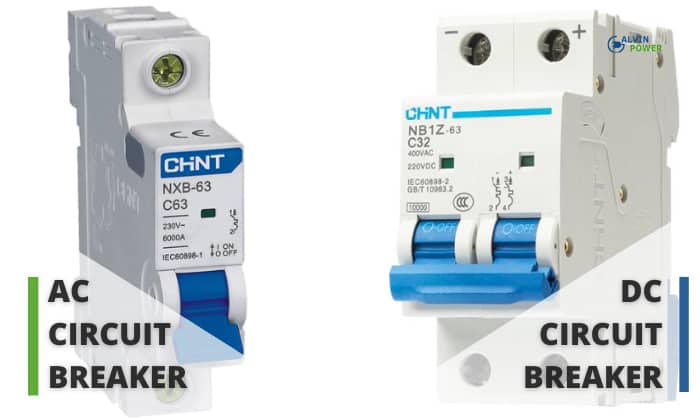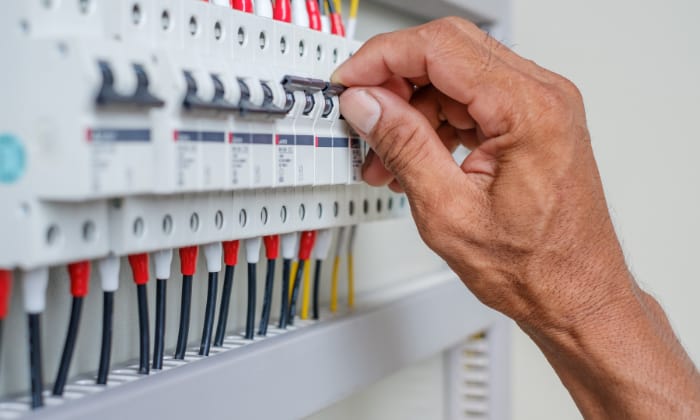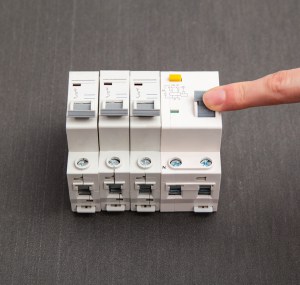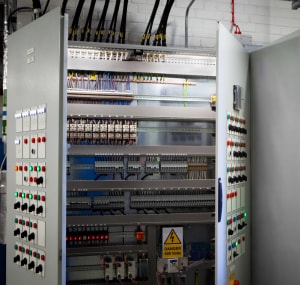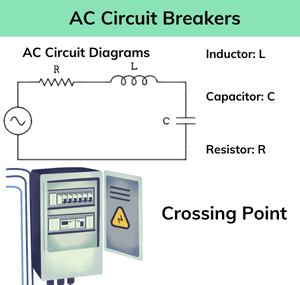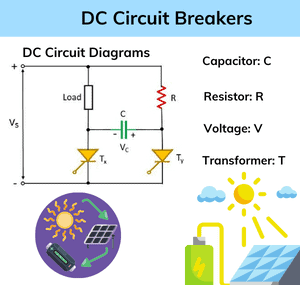In order for our homes to function in a safe manner, our circuits should be installed with the necessary safety devices in order to prevent hazards such as shocks and fires from happening. One equipment that helps us do that is breakers.
There are two types of breaker protection: AC (Alternating Current) and DC (Direct Current) breakers. Due to the difference in their names and the type of electricity they regulate, you may not know which one to use.
I wrote this guide in order to clarify the difference between AC vs DC circuit breaker. Read through my article if you want to learn more!
Before we begin, it would be wise for us to first know what AC and DC circuit breakers are exactly, and how they work.
Table of Contents
What Are AC and DC Circuit Breakers?
1. AC circuit breaker
AC stands for Alternating Current, as I have already mentioned above. From this, we can identify the nature of electricity this type of breaker regulates.
Specifically, alternating current refers to how electrical current moves through a circuit. Electricity that is alternating in its flow changes the direction of its wave in a consistent manner – creating a wave with varying polarity that you may already be familiar with.
Now, what’s special about an AC circuit is how electrical generators produce this type of electricity. Rotary generators specifically produce AC electricity as the cogs of the machine alternate the flow and polarity of the electrons in an electrical system.
Due to the very nature of AC currents, there is a high possibility that most of the circuit breakers you have at home are AC breakers.
Related: Detailed Steps to Reset AC Circuit Breaker
2. DC circuit breaker
On the other hand, the DC in DC breakers stands for Direct Current. Compared to AC current, DC electricity, for its namesake, operates in a straightforward and direct manner.
There is no alteration in voltage whatsoever for DC electricity. Specifically, direct current provides an electric output that is consistent and unchanging throughout its course.
It is unidirectional, meaning that the direction of its current remains constant and would remain that way until it is received by an electrical appliance.
Because of how DC current works, this type of electrical flow is often only used for industrial applications. Thus, DC circuit breakers can often be found in factories and systems that specifically require the electrical flow to operate in a constant manner.
How Do AC and DC Circuit Breakers Work?
1. AC circuit breakers
If you take a look at AC circuit diagrams, you’d notice that there is a switch and trip instrument within the breaker.
This type of breaker works by opening its contacts when the AC current running through exceeds the “crossing point” of the breaker.
2. DC circuit breaker
DC circuit breakers also work the same way as other breakers in general.
For instance, this type of breaker also contains a shut-off and switch mechanism that enables it to cut the direct connection of the circuit itself to the main power line.
Perhaps the only notable difference is that DC circuit breakers have a higher point of trigger. The extinguishing point – the flow of electricity regulated by the breaker – is noted to be steeper due to the nature of 12V DC or any volts in general.
Hence, DC circuit breakers have a more unique architecture and engineering when it comes to interrupting the flow of the different types of DC electricity in the circuitry.
They often handle the electrical load for solar panels, given that the type of electricity they produce is direct in nature.
What is the Difference Between Ac and Dc Circuit Breakers?
Given that we have presented the specific functions of both AC and DC circuit breakers – with regards to how they particularly work – we could now take a look at how both differ from one another.
While both protect against electrical faults, DC breakers have more arc extinguishers because unlike AC circuits, a DC overload doesn’t have a value of zero at any point in a cycle and its current flows across a wider gap.
DC voltage also tends to be higher, up to 1,500 volts compared to 480V for AC.
Thanks to recent technological advancements, some manufacturers have now bridged the difference between AC and DC circuit breakers.
Specifically, dual rated AC/DC breakers now provide homeowners with a multipurpose device that could protect against electrical mishaps without the need of installing two different breakers.
AC vs DC Circuit Breakers: Which is Better? Pros and Cons of Both
| Alternating Current Breaker | Direct Current Breaker |
| Can deal with zero crossing and protect equipment in power systems involving transformers
Ideal for motors |
Not for zero crossing but is essential to solar systems, unlike AC breakers
Has simpler wiring than AC types |
| For AC currents | For DC currents |
All in all, the type of breaker you should install highly depends on the type of current running through your circuitry. Take this into consideration before deciding on buying an AC or DC circuit breaker.
As a reminder: don’t attempt to perform an AC to DC switch rating conversion as you cannot switch out one breaker type for another.
Frequently Asked Questions
Are AC and DC circuit breakers the same?
No. AC and DC circuit breakers are not the same. Despite them having the same purpose, the type of circuitry current they regulate varies drastically.
For instance, only AC circuit breakers can be installed in an AC electrical panel. On the other hand, only DC circuit breakers can be used for DC circuitry.
In short, you cannot use AC circuit breaker for DC. Only install the appropriate breaker for the type of electrical setup you’re using.
What is the difference between AC vs DC fuses?
The electrodes on DC fuses are farther apart than those on AC fuses. This is due to the same reason DC breakers have more arc extinguishers: AC voltage sometimes reaches 0 and is easier to cut off.
How can you tell if a circuit breaker is AC or DC?
Basically, you can tell if your circuit breaker is AC or DC based on the label printed or embossed on it. The details should contain its voltage capacity, the amount of current it can handle, and its application.
However, if your breaker does not contain these details, you can determine if it’s an AC or DC circuit breaker based on its appearance. Breakers that handle AC circuitry often need three live wires, while DC types only require one.
Conclusion
Being knowledgeable about the difference between AC vs DC circuit breaker is essential for homeowners seeking to safeguard their homes.
As always, I wish that I have expanded on this topic in a detailed manner. I hope you have understood clearly the difference between AC and DC circuit breakers. If you have any questions, drop them in the question section below. Thanks for reading!
Related comparison:

I am Edwin Jones, in charge of designing content for Galvinpower. I aspire to use my experiences in marketing to create reliable and necessary information to help our readers. It has been fun to work with Andrew and apply his incredible knowledge to our content.

